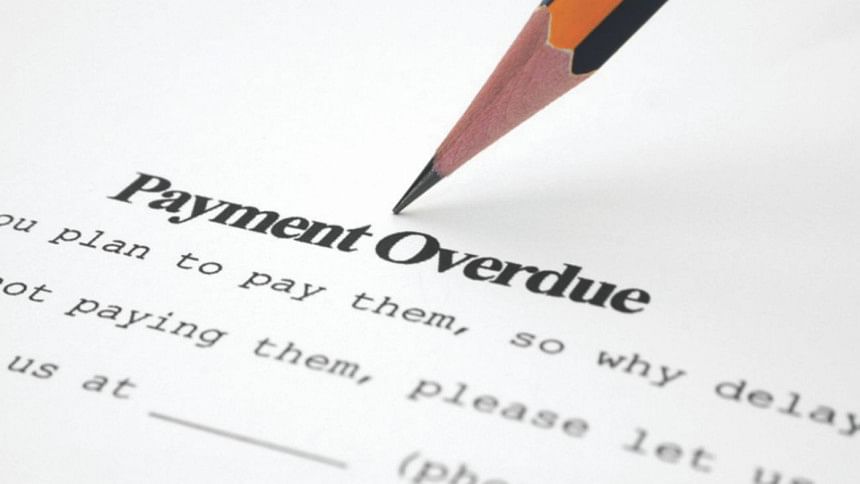A loan defaulting epidemic: Over two lakh privileged institutions!

The informa-tion disclosed by the finance minister in parliament this month, as a response to a question by a member of parliament, is quite an eye opener. As per Bangladesh Bank data the country now has 230,658 defaulters: companies and institutions that have defaulted on bank loans totalling Tk 1.31 trillion until June 2018. We are further informed by the honourable finance minister that many of these defaulters are heavily involved in the management of 88 banks and financial institutions. The bulk of the default loans belong to the State-owned Commercial Banks (SCBs) where Sonali Bank leads with Tk 186.62 billion, followed by Janata Bank (Tk 148.4 billion), Agrani Bank (Tk 92.84 billion), Rupali Bank (Tk 49.01 billion), Basic Bank (Tk 85.76 billion), Bangladesh Krishi Bank (Tk 21.78 billion), and Bangladesh Development Bank Tk 23.32 billion. In the private sector, things aren't particularly rosy either with the National Bank defaulted loan amount at Tk 50.76 billion, Islami Bank Tk 35.20 billion, and Prime Bank Tk 35.85 billion.
The finance minister deserves a round of applause for making public a list of 100 top defaulters which included some of the top business houses and a horde of lesser known names. What comes as a surprise of course is what happened between last June and September of this year, i.e. back in June, the finance minister had hinted that special measures were being taken to address the banking crisis that would come into effect within a month. He is quoted to have said in this paper that "I admit that the conditions of state banks are not up to our expectations and we are continuing to recapitalise these banks. But we need to understand that these banks often cannot operate on commercial basis."
True. Needless to say, the finance minister must be finding himself between a rock and a hard place because of reasons beyond our comprehension, nothing substantial has been done to bring back financial discipline in the banking sector; neither in SCBs, nor in private sector banks. The situation in the privately-owned banks is getting to be as bad as the situation in SCBs. By his own admission, and I quote here, "The problem of the private banks is that they help each other and one bank's director gets loans from another bank". One must ask the question then why was the Banking Company Act amended to allow for four members of the same family to sit on the board of a bank? Again allowing for a person to hold the position of a director of a bank for nine years is counterproductive for good governance.
As pointed out by the International Chamber of Commerce's (ICCB) News Bulletin (Jan-Mar, 2018): "According to a Bangladesh Bank study five years (during CY2012 to CY2016) average ratio of gross NPLs to total loans were about 27.1 percent, whereas, it was 4.9 percent for PCBs, 6.5 percent for FCBs & 22.56 percent for SCBs. The percentage of classified loan to total outstanding stood at 10.1 percent in June 2016. The percentage was highest for the SBs 26.1 percent, for the PCBs 5.4 percent, for the SCBs 25.7 percent and for the FCBs 8.3 percent."
The recurring scams remain unsolved which has only encouraged the culture of default and that is reflected in the rise of NPLs. When we look at CPD's "State of the Bangladesh Economy in FY2017-18 (Third Reading)" released to the media on June 3, 2018, we find observations that tell us that this seemingly unstoppable rise in NPLs is primarily due to a number of reasons: "The general trend of NPL has been consistently high for the last few years. Financial frauds, lack of proper due diligence during loan sanctions, political influence on loan disbursement, and the failure to undertake strong measures against loan defaulters and wrong-doers have contributed to high NPLs in the banks. Additionally, the legal framework for dealing with non-performing loans, which consists of the Money Loan Court Act 2003 and Bankruptcy Act 1997, has become more or less dysfunctional. The number of judges dealing with non-performing loan cases is inadequate, and as a consequence, the backlog of cases is a long one."
Interestingly enough, the general conversation in media has been focused on NPLs. We seldom talk about irrecoverable loans (which is part of NPLs) or loans that banks treat as "written off" and that amount, as of December 2017 (according to CPD) stands at Tk 64,618 crore, which is "87 percent of total classified loans and 8 percent of total loans". That means Tk 8.70 out of Tk 10 non-performing loans will not be returned!
And still we have statements being issued by policymakers that what is printed in news media is rubbish. Unfortunately, the facts speak otherwise. Our central bank cannot move against top bank management despite having ample proof of irregularities in loan sanctioning. Hence, media reports may be awash with irregularities being committed in SCBs but Bangladesh Bank can only advise and not act.
When we look at our banking sector, it is clear as day that we have too many banks and yet policymakers (in their infinite wisdom) continue to grant licenses for more of them. One of these was the ill-fated Farmers' Bank that has been repeatedly bailed out by government largesse but we are yet to see any real effort to bring those responsible for the fiasco to justice. The irregularities that have led to repeated scams and the lack of assertive action to check these irregularities have become all too obvious. Our financial sector and its guardians have succumbed to political pressure and the end game is to use the banks to misappropriate public money. That basically is the bottom line.
Syed Mansur Hashim is Assistant Editor, The Daily Star.





Comments